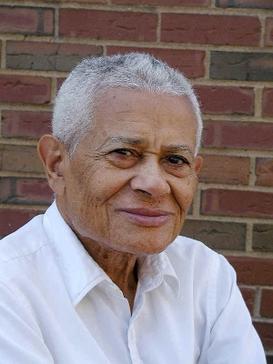William Worthy facts for kids
Quick facts for kids
William Worthy
|
|
|---|---|
 |
|
| Born | July 7, 1921 |
| Died | May 4, 2014 (aged 92) |
| Education | Bates College |
| Occupation | Journalist |
William Worthy, Jr. (July 7, 1921 – May 4, 2014) was an African-American journalist, civil rights activist, and dissident who pressed his right to travel regardless of U.S. State Department regulations.
Biography
Early life
Worthy was born in Boston, Massachusetts, as the son of a wealthy obstetrician. He graduated Boston Latin High School and received a B.A. degree in sociology from Bates College, Lewiston, Maine, in 1942. Worthy was a Nieman Fellow at Harvard University, class of 1957.
During World War II, Worthy was sentenced to one day in prison for dodging a physical examination for military service and failing to register at a conscientious objector's camp. In 1954, he voiced early opposition to American involvement in Vietnam after he visited Indo-China in 1953.
Civil rights activist
Worthy was a civil rights activist and member of organisations such as the Fellowship of Reconciliation, the NAACP or the Fair Play for Cuba Committee, which advocated for a more balanced coverage of Cuba in the US media.
In 1947, he participated in the Journey of Reconciliation together with other prominent civil rights leaders, in which they challenged state segregation laws on public transport. The action inspired the later Freedom Riders.
In the early 1960s he was an outspoken critic of the civil rights movement for not going far enough to achieve civil rights in housing and all areas of American life. William Worthy was one of the most important political allies of Malcolm X. In the late 1960s, Worthy organized a rent strike against a Catholic hospital in New York City that attempted to tear down Worthy's apartment building and turn it into a parking lot. .....
Worthy was a reporter for the Baltimore Afro-American on and off from 1953 to 1980. He wrote a column and covered revolutions in Iran, Cuba, and China. Although a supporter of Malcolm X, he was critical of the Black Panthers in a 1969 column for "gratuitous and indiscriminate" 'Uncle Tom' attacks on virtually all the black bourgeoise" and their exposure to law enforcement due to "sloppy, inefficient, undisciplined organizational follow-through".
Teaching
While Worthy continued to work in the field of journalism; in the 1970s, he was appointed as head of the African American journalism program at Boston University. However, the BU president, John Silber, removed Worthy as head of the program after Worthy criticized the BU administration and supported BU campus workers who were attempting to unionize. Following his BU appointment, Worthy taught journalism at UMass Boston. William Worthy and Michael Lindsey co-taught the first class in Critical Journalism in the country at the College of Public and Community service, a branch of UMass Boston, which Noam Chomsky attended as a guest lecturer. William Worthy also taught at Howard University in the 1980s and 1990s, where he held the Anneberg Chair. During most of the 1990s until 2005, Worthy lived in Washington, D.C., where he served as a special assistant to the dean of the School of Communications at Howard U. and served on the board of directors of the National Whistleblower Center.
On February 22, 2008, the Nieman Foundation honored Worthy with the prestigious Louis M. Lyons Award.
Death and legacy
Worthy died in Brewster, Massachusetts on May 4, 2014, at the age of 92, of Alzheimer's disease.
The late psychologist Kenneth B. Clark said of Worthy: "The Bill Worthys of our society provide the moral fuel necessary to prevent the flickering conscience of our society from going out."
Works
- Our Disgrace in Indo-China. 1954.
- The Silent Slaughter: The Role Of The United States In The Indonesian Massacre. With Eric Norden, Andrew March, and Mark Lane. 1967.
- The Vanguard: A photographic essay on the Black Panthers. With Ruth-Marion Baruch and Parkle Jones. 1970.
- Pampered Dictators and Neglected Cities: The Philippine Connection. 1978.

